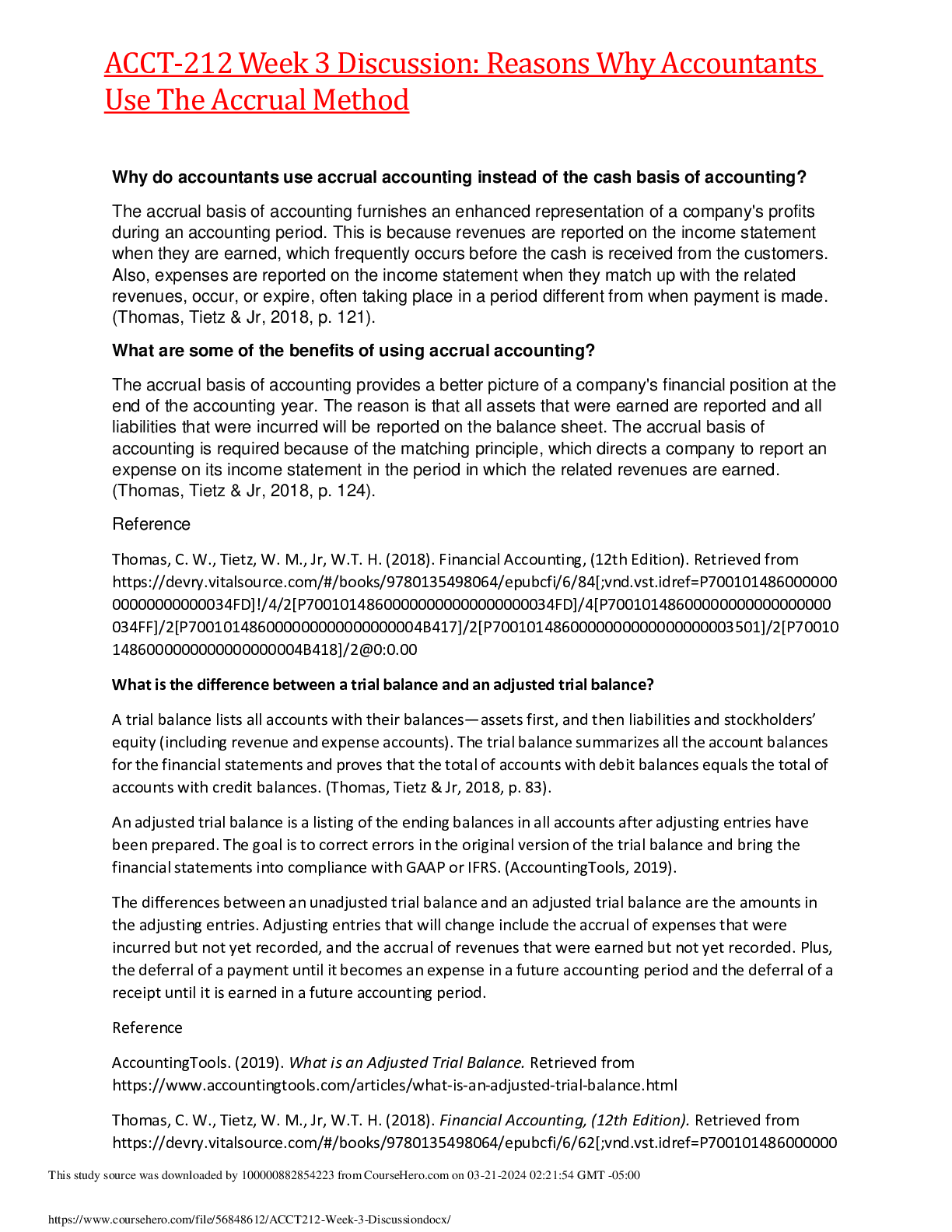Accounting > DISCUSSION POST > ACCT-212 Week 3 Discussion: Reasons Why Accountants Use The Accrual Method (All)
ACCT-212 Week 3 Discussion: Reasons Why Accountants Use The Accrual Method Why do accountants use accrual accounting instead of the cash basis of accounting? The accrual basis of accounting furn ... ishes an enhanced representation of a company's profits during an accounting period. This is because revenues are reported on the income statement when they are earned, which frequently occurs before the cash is received from the customers. Also, expenses are reported on the income statement when they match up with the related revenues, occur, or expire, often taking place in a period different from when payment is made. (Thomas, Tietz & Jr, 2018, p. 121). What are some of the benefits of using accrual accounting? The accrual basis of accounting provides a better picture of a company's financial position at the end of the accounting year. The reason is that all assets that were earned are reported and all liabilities that were incurred will be reported on the balance sheet. The accrual basis of accounting is required because of the matching principle, which directs a company to report an expense on its income statement in the period in which the related revenues are earned. (Thomas, Tietz & Jr, 2018, p. 124). Reference Thomas, C. W., Tietz, W. M., Jr, W.T. H. (2018). Financial Accounting, (12th Edition). Retrieved from https://devry.vitalsource.com/#/books/9780135498064/epubcfi/6/84[;vnd.vst.idref=P700101486000000 00000000000034FD]!/4/2[P70010148600000000000000000034FD]/4[P70010148600000000000000000 034FF]/2[P700101486000000000000000004B417]/2[P7001014860000000000000000003501]/2[P70010 1486000000000000000004B418]/2@0:0.00 What is the difference between a trial balance and an adjusted trial balance? A trial balance lists all accounts with their balances—assets first, and then liabilities and stockholders’ equity (including revenue and expense accounts). The trial balance summarizes all the account balances for the financial statements and proves that the total of accounts with debit balances equals the total of accounts with credit balances. (Thomas, Tietz & Jr, 2018, p. 83). An adjusted trial balance is a listing of the ending balances in all accounts after adjusting entries have been prepared. The goal is to correct errors in the original version of the trial balance and bring the financial statements into compliance with GAAP or IFRS. (AccountingTools, 2019). The differences between an unadjusted trial balance and an adjusted trial balance are the amounts in the adjusting entries. Adjusting entries that will change include the accrual of expenses that were incurred but not yet recorded, and the accrual of revenues that were earned but not yet recorded. Plus, the deferral of a payment until it becomes an expense in a future accounting period and the deferral of a receipt until it is earned in a future accounting period. Reference AccountingTools. (2019). What is an Adjusted Trial Balance. Retrieved from https://www.accountingtools.com/articles/what-is-an-adjusted-trial-balance.html Thomas, C. W., Tietz, W. M., Jr, W.T. H. (2018). Financial Accounting, (12th Edition). Retrieved from https://devry.vitalsource.com/#/books/9780135498064/epubcfi/6/62[;vnd.vst.idref=P700101486000000 00000000000026D0]!/4/2[P70010148600000000000000000026D0]/2/2[P700101486000000000000000 004A71D]/2@0:0 [Show More]
Last updated: 1 year ago
Preview 1 out of 2 pages

Buy this document to get the full access instantly
Instant Download Access after purchase
Buy NowInstant download
We Accept:

Can't find what you want? Try our AI powered Search
Connected school, study & course
About the document
Uploaded On
Mar 21, 2024
Number of pages
2
Written in
All
This document has been written for:
Uploaded
Mar 21, 2024
Downloads
0
Views
61
Scholarfriends.com Online Platform by Browsegrades Inc. 651N South Broad St, Middletown DE. United States.
We're available through e-mail, Twitter, Facebook, and live chat.
FAQ
Questions? Leave a message!
Copyright © Scholarfriends · High quality services·